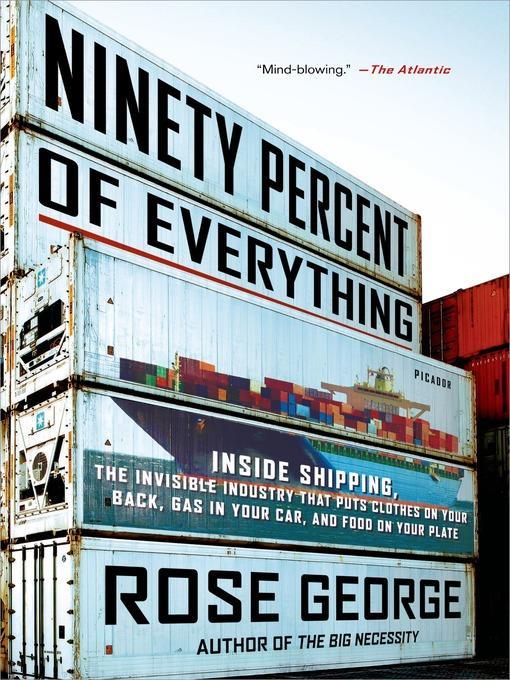
Ninety Percent of Everything
Inside Shipping, the Invisible Industry That Puts Clothes on Your Back, Gas in Your Car, and Food on Your Plate
کتاب های مرتبط
- اطلاعات
- نقد و بررسی
- دیدگاه کاربران
نقد و بررسی

July 29, 2013
Though the romance is gone from seafaring life, journalist George's (The Big Necessity: The Unmentionable World of Human Waste and Why It Matters) multifaceted exploration of the global shipping industry gamely reintroduces an element of wonder. Nearly all goods sold worldwide are transported by container ship, which make workaday passage through the Straits of Malacca, the Suez Canal, and other channels kept in constant motion by an expanding global economy. One of George's main points is that freight shipping remains largely behind the scenes, leading to a byzantine system of concealed ownership structures, convoluted regulations, a labor force largely drawn from developing nations, and inhumane working conditions. In a lengthy, thoughtful section, George takes to sea on the Kendal, a container ship of the Maersk shipping line, and explores these issues, and the very real threat of piracy along the Somali coast. George's work unfortunately suffers from a civilian's perspective on a closed professional fraternity. She searches for the poetry and elevated thought that informs literary accounts of a life at sea, but as one of the pragmatic crewmen notes: "For us, it is just work." 10 b&w illus.

May 1, 2013
Consistently illuminating in-depth analysis of the global shipping industry. British journalist George (The Big Necessity: The Unmentionable World of Human Waste and Why It Matters, 2008) deftly explores how "ninety percent" of everything consumers enjoy is conveyed across international waters. For such an essential service fueled by economic interdependence, it's mostly overlooked and taken for granted by the same public who are forbidden from the docks and the transport ships. Granted access for her research, the author, a self-proclaimed landlubber, traveled 6,000 miles over five weeks aboard the 80,000-ton Maersk Kendal container vessel. She became personally acquainted with six ports, five seas and two oceans, and she comprehensively reports the details behind the shipping experience and the haunting historic lore of "lost" ships and missing crew. She also considers the sustainability of oceanic life subsisting just beneath these noisy, imposing monstrosities. Once befriended by the ship's captain, she absorbed his harrowing stories (dubbed "swinging the lantern") of thieving dockworkers and torrid excursions ashore. The most interesting facets of her seafaring adventure are those that compromised her personal safety--e.g., when pondering how to survive for weeks on a lifeboat or, worse, when the Maersk drifted into treacherous Somali pirate zones. A sleepless night of rattling false alarms spurs a chapter on piracy history and facts on how contemporary pirates bargain for ransom (via Skype). While this eye-opening maritime expose fails to carry the same bizarro heft as The Big Necessity, it should affirm her place among offbeat, endlessly curious authors like Mary Roach. An apt and affable nautical chaperone, George's watery excursion fascinates and dutifully educates.
COPYRIGHT(2013) Kirkus Reviews, ALL RIGHTS RESERVED.

July 1, 2013
In her debut work of nonfiction, The Big Necessity (2008), George profiled the generally unmentionable topic of human waste. In a similar vein, her latest work plumbs the ins and outs of the shipping industry, a subject that can more easily be discussed in polite company but somehow rarely is. It turns out shipping's virtual invisibility has as much to do with deliberate attempts by industry magnates to deflect scrutiny of unsafe working conditions and shady business dealings as it does with public indifference. In between chapters describing the voyage she took on the massive, 20-story freighter Maersk Kendal to research her book, George provides a wealth of detail about shipping's inner workings, from statistics on the amount and types of ships crossing our oceans to snapshots of the unheralded crew members who keep them running. She is also unsparing in exposing the hazards of contemporary seafaring life, including often unreported but rampant acts of piracy. George provides an engaging, much-needed, and in-depth tribute to shipping's essential role in providing worldwide goods and services.(Reprinted with permission of Booklist, copyright 2013, American Library Association.)

























دیدگاه کاربران